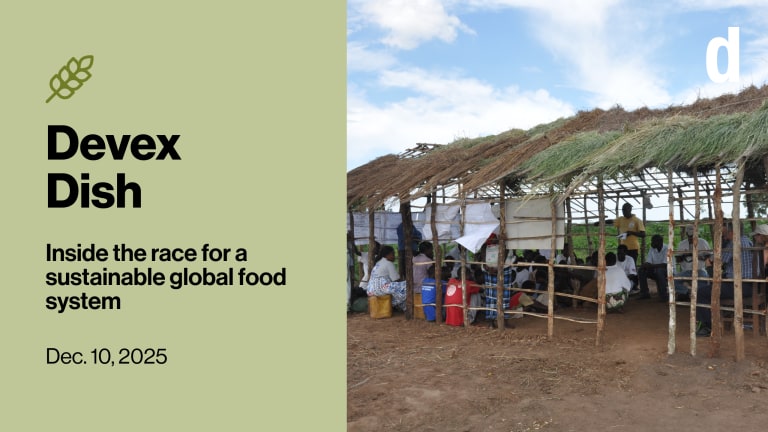Is the COVID-19 pandemic a cash transfer tipping point?
Cash transfers have been a key tool in the response to social and economic fallout from the pandemic. Will the crisis give rise to a new era that puts cash at the center of global development?
BURLINGTON, Vt. — As the COVID-19 case count continues to climb, Ugo Gentilini, global lead for social assistance at the World Bank, has been keeping track of another statistic that is on the rise: the number of cash transfer programs that countries are deploying for social protection during the crisis. “What we have seen now in terms of expansion of coverage, but also in terms of generosity of those transfers being ... almost doubled in size, didn't occur by accident,” Gentilini told Devex. “This is because of the evidence that was built beforehand, and that somewhat clearly shows that cash transfers are not really a cost, but they are an investment. They pay out. They pay out in very different ways. They help build human capital. They help with enhancing resilience. They help with economic and financial inclusion,” he said. That message has circulated in the global development sector for years, as more donors embrace cash as an efficient and effective means of achieving humanitarian and development goals. The COVID-19 pandemic, however, has seen cash transfer programs proliferate, as governments, funders, and development organizations try to provide social protection payments to people who have lost income or incurred new expenses due to the economic fallout from the coronavirus. In July, Gentilini published a synthesis of his findings. He recorded 298 cash transfer programs in 139 countries. Those programs with available data ranged in duration from one to 12 months — averaging 3.1 months — and some countries increased their average coverage by 244%. Gentilini found that the combination of cash transfer programs existing before the pandemic and those introduced in response covered 38% of the populations of certain countries. The dramatic increase in the use of cash transfers has people who have long argued they should play a bigger role in the global development landscape wondering if this crisis will be remembered as a tipping point. “The signals out there point to COVID as an important milestone. I wonder whether it will help move social protection toward a new equilibrium,” Gentilini said. A high-water mark? One of the organizations most closely associated with direct cash transfers is GiveDirectly, the New York-based nonprofit known for sending cash grants to people living in poverty. While acknowledging that its work plan is constantly changing due to the pandemic, this year the organization expects to distribute roughly four to five times more than it has in any previous year, Joe Huston, managing director at GiveDirectly, told Devex. Huston said GiveDirectly has seen increased interest from a broad range of potential donors, including bilateral aid agencies like the U.S. Agency for International Development and the U.K. Foreign, Commonwealth & Development Office but also family foundations, celebrities, and governments that are eager to partner. “A big unknown for me is whether this is a one time moment ... or if it's a kind of new high-water mark for the industry in terms of cash transfers and direct aid,” Huston said. He added that current “extraordinary measures” still feel like the product of “emergency decision-making” and it remains to be seen “whether this changes cash's long-term role within the development toolbox.” Even if many of these social protection measures were imagined as one-off or short-term responses, the fact that donors and governments have implemented so many cash transfer programs in response to COVID-19 could change their longer-term status in meaningful ways. Bilateral donors such as USAID have recently experimented with cash benchmarking, a method of development effectiveness research that compares the impact of a development intervention against a baseline of just giving people cash to measure whether the intervention adds significant value. “What we actually want is development, and development is more than cash. But cash has a big role to play.” --— Ugo Gentilini, global lead for social assistance, World Bank “For a lot of funders and for governments, they're getting experience this year and maybe next with much larger proportions of their work getting done through cash transfers,” Huston said. For some governments, that can lead to greater comfort with cash transfers as a development policy option, which could have knock-on effects for the way regulators treat these programs, Huston said. Then, as donors start to think about returning their programming to its prior form, they will be faced with something that resembles a larger-scale cash benchmarking exercise, he added. “There’s a real opportunity … to have those kinds of real cash benchmarking conversations outside of a given study or a particular thought experiment, because there's literal dollars that you're talking about switching back and forth,” Huston said. “If we're able to get good measurement on what people feel like the effects have been from the current round of cash, I think that could be a really exciting moment,” he added. Risk and vulnerability If cash transfers for social protection do gain long-term traction due to the pandemic, it could be part of a larger shift in how the world thinks about development. “This is a global shock, and there's going to be many tipping points coming out of this,” said George Gray Molina, head of strategic policy engagement and chief economist at the United Nations Development Programme. The “architecture of social protection” could play host to one of those tipping points, but there will be others as well, Molina said. “We're starting to think at scale about risk, and this is going to spill over into the way we address climate change in the future,” Molina predicted, adding that while climate change has typically been viewed as an environmental issue, in 50 years it will more likely resemble the current crisis caused by COVID-19. “If that's the case, we need to create an architecture and a process that addresses risk of the type that we're seeing right now but in perpetuity, because it's not going to go away,” Molina said. “There are different ways in which you can deal with it, but they're all speaking to the same issue, which is that … everyone is vulnerable,” he added. The pandemic might bring about a shift in thinking about development. Instead of seeing it as a ladder that people and communities climb toward a higher gross domestic product per capita, it could be viewed as a means of addressing risk and vulnerability. “Maybe that's not the right metaphor for development. Maybe we need some other metaphor. ... And I think we're learning about that now,” he said. A way of reaching people Gentilini does not expect that cash transfers will replace other development interventions — nor does he think they should. Cash, however, comes with unique advantages, and other development programs could also benefit from them. “It's not just a transfer per se, but it's a window. It's a way of reaching people ... very concretely and leveraging that to provide more and different types of programs,” he said. During the pandemic, organizations such as GiveDirectly have had to experiment with exactly how they reach people, given the constraints on in-person contact and the challenges of travel. Those restrictions make it particularly difficult to identify and enroll marginalized groups, but the organization has turned to partnerships with nonprofit organizations and telephone companies for lists of people likely to be vulnerable, and it is experimenting with phone-based sign-ups and self-enrollment, Huston said. When cash transfer programs are able to bridge those gaps, however, it can be a powerful starting point for other services. “You lack information, you lack delivery systems to reach them, and the moment that you're able to do that with something very concrete like cash, it's something that you can build upon, because people need a lot more than cash,” Gentilini said. He added that there is a risk in viewing cash transfers as an end in themselves and in assuming that if people have received cash, they do not need any other assistance. “What we actually want is development, and development is more than cash. But cash has a big role to play,” he said.
BURLINGTON, Vt. — As the COVID-19 case count continues to climb, Ugo Gentilini, global lead for social assistance at the World Bank, has been keeping track of another statistic that is on the rise: the number of cash transfer programs that countries are deploying for social protection during the crisis.
“What we have seen now in terms of expansion of coverage, but also in terms of generosity of those transfers being ... almost doubled in size, didn't occur by accident,” Gentilini told Devex.
“This is because of the evidence that was built beforehand, and that somewhat clearly shows that cash transfers are not really a cost, but they are an investment. They pay out. They pay out in very different ways. They help build human capital. They help with enhancing resilience. They help with economic and financial inclusion,” he said.
This story is forDevex Promembers
Unlock this story now with a 15-day free trial of Devex Pro.
With a Devex Pro subscription you'll get access to deeper analysis and exclusive insights from our reporters and analysts.
Start my free trialRequest a group subscription Printing articles to share with others is a breach of our terms and conditions and copyright policy. Please use the sharing options on the left side of the article. Devex Pro members may share up to 10 articles per month using the Pro share tool ( ).
Michael Igoe is a Senior Reporter with Devex, based in Washington, D.C. He covers U.S. foreign aid, global health, climate change, and development finance. Prior to joining Devex, Michael researched water management and climate change adaptation in post-Soviet Central Asia, where he also wrote for EurasiaNet. Michael earned his bachelor's degree from Bowdoin College, where he majored in Russian, and his master’s degree from the University of Montana, where he studied international conservation and development.








